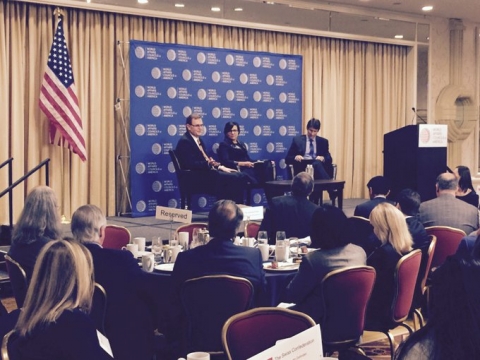Nov182016
Posted at 4:12 PM
This week, U.S. Secretary of Commerce Penny Pritzker participated in an armchair discussion at the World Affairs Council of America annual conference titled “Shaping the American Competitiveness Agenda for the 21st Century.” Secretary Pritzker was joined by fellow panelist and UPS CEO David Abney and moderator Edward Alden, senior fellow at the Council of Foreign Relations. During the discussion, the Secretary highlighted policies that America must pursue in order to stay competitive, grow the economy, and generate opportunity for working families.
Here are three key takeaways from their discussion:
1.The future of trade is fundamental to America’s economic strength
International trade strengthens America’s economy, global leadership, and national security. Continuing to open markets to American goods and services abroad is critical to U.S. competitiveness. Secretary Pritzker stressed that while trade remains a complicated topic for many citizens, the U.S. cannot pull up its drawbridges and retreat into isolation. Instead, we must continue explaining the benefits of trade to all Americans, while helping those that have experienced disruption due to the effects of globalization, automation, and trade become equipped for the jobs of the 21st century.
2.The United States is—and will remain—the best place in the world to do business
Secretary Pritzker emphasized America’s competiveness in attracting foreign direct investment (FDI), a key driver of economic growth, job-creation, innovation, and exports. Strong rule of law and IP protections; global leadership in R&D; and the talent, ingenuity, and productivity of the American people attract investors to the United States, where economic growth is significantly outpacing that of every other advanced nation. In fact, A.T. Kearney has named the United States the best place in the world to invest for four years running.
One significant legacy of the Obama Administration has been SelectUSA, the first federal initiative focused on creating world class investment promotions to attract foreign direct investment to the United States. Launched in 2013 and housed at the Commerce Department, SelectUSA has facilitated $23 billion in foreign direct investment and has established presence at the U.S. embassies in each of the 30 largest markets for U.S. investment globally.
To ensure that America remains a competitive investment destination, we must ensure that our markets remain open to foreign investment and that companies that produce here can easily export their goods. In addition, we must do all that we can to strengthen the competitiveness of our workforce, both through job-driven training efforts and immigration policies that attract the best and the brightest to our shores.
3.The path forward should build on years of progress
Secretary Pritzker noted that the next Administration should build on these successes to ensure American competitiveness and global standing. For example:
- U.S. businesses have now added 15.5 million jobs since private sector job growth turned positive in early 2010.
- The economy has added more than 800,000 manufacturing jobs since 2010.
- For four straight years, America has been named the best place in the world to invest.
- The uninsured rate is at the lowest level on record.
- Carbon emissions have come down.
She noted that efforts should focus on further investments in American workers and infrastructure—both digital and physical. In addition, the U.S. should continue to advocate for a more holistic approach to workforce training that is not only job-driven, but that provides support (even social services support) in communities that need it.


